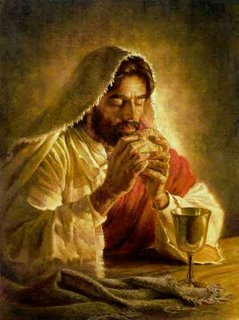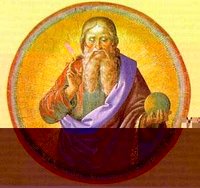FUMC Page 1 12/24/2006
We made it. Christmas day is tomorrow. After the two worship services today most of us will be enjoying family and recovering from the hustle and bustle of the season. Steph, the kids and I will be driving to Texas (yeehaw!). Whatever you may be doing on the 25th remember, the Church set aside this day to remember the Incarnation—God putting on flesh and becoming human. Christmas is the day to celebrate Emmanuel, God with us, the greatest gift ever given.
Emmanuel. God with us. That’s what Christmas is all about. And to speak the name should be enough. I should be able to simply stand up and say God is with us and that should be enough to move us on our way, longing to look out for one another, making us yearn to be connected to this creator of the universe who loved us so much that he gave up heaven to come to earth to be with us. God with us. Why even say more?
There’s a part of me that wants to say nothing else. If I stop now it’s a happy message—one that will make us all feel good; one that reminds us how much God loves each one of us, and one that helps us to grasp how important we are to God. But I will say more because it is important to do so. All week, Stephanie and I have struggled with writing a sermon about Emmanuel—God with us—as our hope, our peace, and our joy. We had this idea that we would write something uplifting so that everyone would leave feeling happy and joyous on Christmas Eve, and so that happy feeling would take us through Christmas Day. But then Thursday happened. Thursday was the day we passed out food baskets and gifts to needy families in Sardinia.
On Thursday morning, Steph went to the store and bought all of the perishable items and then Linda, Marge, and Dennie came on Thursday afternoon and helped me get the boxes organized and ready. And then at five Steph went to the church to pass everything out. There is a part of me—that would like for things at that point to have gone something like this: the people walk in, tell me their names, take the food, and go. I know that sounds a bit harsh and I don’t mean to sound ugly, but if things would have worked that way, that would have been easy. Instead, a good number of people walked through the door and told their stories. One woman can’t work because of a bad accident a couple of years ago and so now all of her utilities will soon be turned off. One young couple with three small children struggles as the husband tries to go to college and can’t find a job that will work around his schedule. One woman just looked completely overwhelmed by the gifts. I mean completely overwhelmed. She’s struggling through a bad divorce and she’s trying to work and earn her GED and raise three kids all at the same time. And on top of all that, her car was stolen on Thanksgiving weekend. One woman has a seventeen year old daughter with a three year old child and another daughter who I think is a drug addict. One woman has three sons and I’m pretty confident that she’s an alcoholic. One woman’s husband is an alcoholic and his alcoholism is completely destroying their family life. Every family comes with a story, and some of those stories aren’t so great.
Later on in the evening Joy Polstra came and helped out for a while. She heard a few of the stories, too. And I heard some of Joy’s story—parts that I hadn’t heard before. And we had a good conversation about what was going on. Steph told her that the days where we buy food and give out meals are the worst and the best days. She asked why they were the worst. Steph told her that we don’t love doing the shopping and the organizing necessary to make a day like this happen. It takes a long time and a good amount of concentration. But then Steph was also really honest and told her that the pastoring part of being a pastor doesn’t come easy to her. (Isn’t that a great thing to hear one of your pastors say?) That is why she keeps doing the food pantry and the Thanksgiving and the Christmas meals. At this point in her life, this is the only thing that keeps her connected with the poor and the needy.
Thursday night Stephanie did something that she rarely does—she went to bed at 10:00. Part of the reason was because she was physically tired. But I think the bigger reason is because we were emotionally spent. Their stories don’t simply go away. Their stories are now forever a part of us. And we feel powerless.
Steph and I sat down and we talked about all of this. And we talked about Emmanuel—God with us. The four Advent candles traditionally represent love, peace, joy, and hope. This is Emmanuel—God with us. Out of his great love, God sent Jesus to be our peace, our joy, and our hope. We call this act the incarnation. The word literally means “in the flesh.” God is with us. But, as Steph and I discussed all that had happened on Thursday, the question arose: how is God “Emmanuel” for the folks we met last Thursday? How is God love, and peace, and joy, and hope for those distressed faces that walked through the door? This is the question we must struggle to answer…
Let me switch gears—our reading from Titus is quite interesting when taken in context. Titus is a short letter. It was written by Paul to Titus who was leading the church at Crete. Paul says to Titus in chapter one, “I left you in Crete so that you might put in order what was left unfinished and appoint leaders in every town.” Titus was supposed to be in the business of putting upstanding people in charge of what were most likely small house churches. Paul then reminds Titus that there was a group of Jews going around telling people that they had to be circumcised first in order to be a Christian. And no—this is not anti-Semitic literature—Paul was a Jew also. Paul wasn’t calling Jews troublesome—he was calling the “circumcision group” troublesome. So then Paul says to Titus—you’re job is to teach people what is appropriate to sound doctrine. And he gives a list to give to the people and the list is about behavior. Here’s how these certain groups of people should act so that “God our Savior will be attractive.” And that’s where our reading starts, “For the grace of God has appeared that offers salvation to all people. It teaches us to say ‘no’ to ungodliness and worldly passions, and to live self-controlled, upright and godly lives…while we wait for our blessed hope.”
“The grace of God has appeared.” Here’s my brief interpretation:
“Act like you believe what you say you believe so that God will be attractive because God’s love and salvation is for everybody.”
Generally when I read these types of passages I focus in on the “God’s love is for everybody” parts of it, but right now I’m focused in on the “Act like you believe what you say you believe” part.
What is it that we believe? As Christians what do we believe about how we should act? One way to begin to find an answer is to go to the source. In Luke chapter four, we find Jesus in the synagogue in Nazareth, his hometown. This episode takes place very early in his ministry. He stands up and he takes the scroll of Isaiah and he says, “The Spirit of the Lord is on me, because he has anointed me to preach good news to the poor. He has sent me to proclaim freedom for the prisoners and recovery of sight for the blind, to release the oppressed, to proclaim the year of the Lord's favor." 20 Then he rolled up the scroll, gave it back to the attendant and sat down. The eyes of everyone in the synagogue were fastened on him.”
The way Jesus, Emmanuel, the incarnate One, starts his ministry is our first clue. He makes very clear who his message is for and what he has come to do. As we keep reading through the gospels we find that Jesus over and over again goes to the poor, the helpless, and the outcasts. We find that Jesus loves and touches the unclean, the women, the forgotten, the Gentiles—all the people that he isn’t supposed to touch. And he proclaims the good news—that the kingdom of God is at hand. In other words, he tells the people that Emmanuel has come. Jesus is the good news! The incarnation—the fact that God has come in the flesh to be with us is the good news!
Now, do we really believe that Jesus is our ultimate example? Do we really believe that in Jesus we find our hope, our joy, and our peace? Because our actions are based on our beliefs, aren’t they? This is what Titus is telling us. Say “no” to all of the stuff that keeps you from loving your neighbor. Say “no” to ungodliness and worldly passions so that your life can make a difference for the kingdom of God. We are saved to do good so that others might want to be saved so that they will do good so that others might want to be saved. See how that works? The cycle keeps going, one person at a time, redeeming and reconciling a lost and hurting world.
Emmanuel. God with us. How is “God with us” for those people who walked through the door on Thursday evening or for the kids I see standing on the street corner? I don’t know all of the answers, but I hope that together we can figure some out. I open to suggestions for outreach to the schools. Let’s prayerfully consider what we can do in this community.
Part of what we are called to do as Christians is to get together and figure out ways to act like Christians. I am starting a program in January that is designed to help us do just that. You’ll find information on the insert about the 1st meeting that will take place at the Sardinia church. All four churches are invited to come and learn about this program. The January 9th meeting will be an informational meeting. The whole point of program is to help us to study the Bible together, to pray together, to be in relationship together, to be accountable to one another, so that our individual lives will be enhanced and then our communal life will be enhanced and then we will make God attractive to those around us. The point is to teach us to live incarnationally. A reason that we celebrate Christmas is to remind ourselves of God’s great gift to us and also to remind us that we now represent God’s great gift. Living incarnationally means that we are fully aware of the fact that we represent Jesus to a lost and hurting world. The people who walked through the door on Thursday hopefully got a glimpse of what God with us looks like, but we all know that a meal and some gifts aren’t enough. We all know that the real answer is Jesus. I ran across a poem that I would like to share with you. This poem is about the importance of incarnational living. It was written by Tim Celek and Dieter Zander.
Do you know,
do you understand
that you represent
Jesus to me?
Do you know,
do you understand
that when you
treat me with gentleness,
it raises the question in my mind
that maybe he is gentle, too?
Maybe he isn't someone
who laughs when I am hurt.
Do you know,
do you understand
that when you listen to my questions
and you don't laugh,
I think,
"What if Jesus is interested in me, too?"
Do you know,
do you understand
that when I hear you talk about arguments
and conflict and scars from your past
that I think, "Maybe I am just a regular person
instead of a bad, no-good, little girl who deserves abuse?"
If you care,
I think maybe he cares --
and then there's this flame of hope
that burns inside of me,
and for a while,
I am afraid to breathe
because it might go out.
Do you know,
do you understand
that your words are his words?
Your face,
his face
to someone like me?
Please be who you say you are.
Please, God, don't let this be another trick.
Please let this be real.
Please.
Do you know,
do you understand
that you represent
Jesus to me?
This is Emmanuel.
As you leave today and you go about the business of Christmas celebrations, leave feeling really, really good. God really loves you. Christmas proves how much God loves you. But I want you to also begin thinking about living incarnationally in a lost and hurting world.
I know I don’t say it enough, but we truly are blessed to be your pastoral family. May Emmanuel be born anew in your hearts and homes every day.
Amen.
Benediction:
Go in peace, love and care for one another in the name of Christ, and may the hope, the joy, the peace, and the love of God dwell richly within you; may God grant unto you a humble spirit and an a compassionate heart, and may his strength, his tenderness, his wisdom and his grace guide you and support you both now and forevermore. Amen
1








